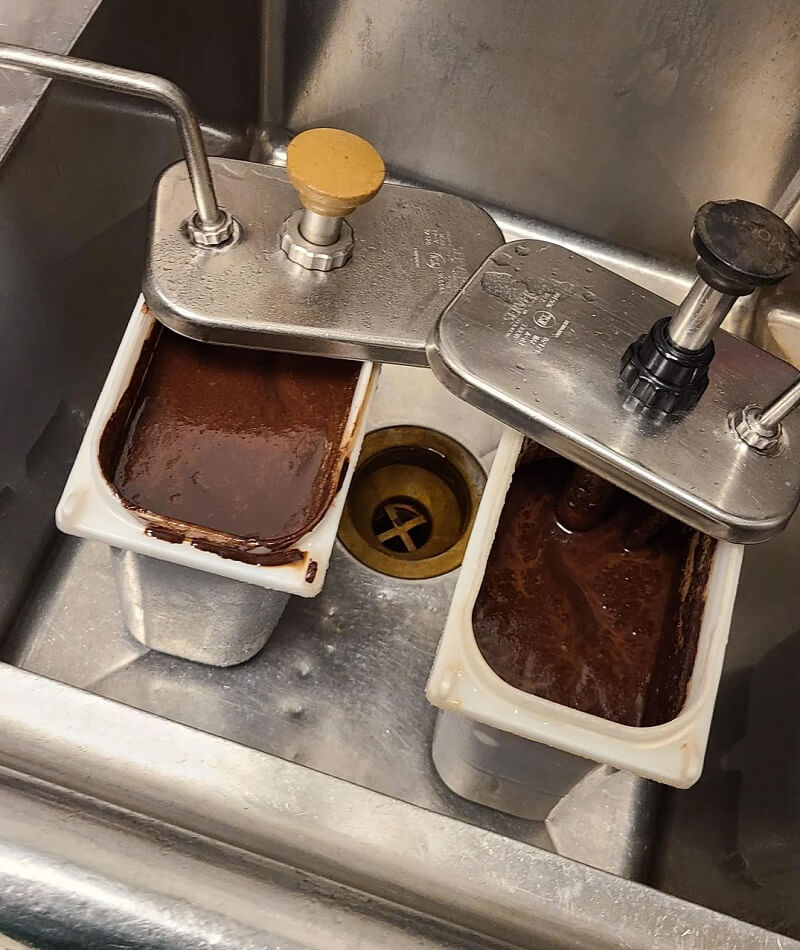A Starbucks employee sparked an important conversation about food waste after sharing that they had to toss large volumes of a tasty product at the end of their shift.
What happened?
In the subreddit r/starbucks, the employee shared a photo of two containers of mocha sauce that unfortunately didn't get used during opening hours.
"9pm rolls around and my [shift supervisor] sets these big bois in the sink, and we're both like, 'This is so wasteful,'" the original poster explained in the caption.

Other Redditors wanted to learn more about what led to the issue.
"Why make that much mocha if it's gonna get tossed? … If you need to make more… then make more," one person suggested, to which the OP replied, "I KNOWWW but manager says to make two batches."
"One night I dumped 4 containers… smh wasteful…" someone else said.
Why is this concerning?
Based on the information provided, the OP didn't appear to be aware of any policies that would help reduce the waste, like donating the sauce as a special treat.
According to Feeding America, millions of people in the United States struggle to obtain enough nutrition, but $473 billion worth of food is tossed every year.
In landfills, food waste releases the heat-trapping gas methane, contributing to an increase in crop-destroying weather events caused by an overheating planet.
It is possible that food safety guidelines influenced the supervisor's decision. Items that surpass certain temperatures, for example, can be susceptible to problematic bacteria growth.
However, some businesses have taken action to prevent such a scenario, making many customers happy in the process. An Arkansas Kroger and a Trader Joe's are among the individual stores that have donated or given away food during power outages.
The OP also didn't mention the possibility of composting, though it's unclear if all of the ingredients in the mocha sauce would be ideal for that type of program.
Is Starbucks doing anything about food waste?
The company shares on its website that it partnered with Feeding America and other hunger-relief organizations based on employee feedback in 2016.
After being picked up in refrigerated trucks, unsold pastries and fresh food items are distributed to food banks and pantries. According to Starbucks, this program has prevented almost 70 million pounds of food from going to waste.
It also has a number of ongoing programs to fight against food insecurity, including a $1.5 million mobile pantry initiative that takes items to people living in "food deserts" — places without accessible grocery stores. The company says it intends to reinvest $100 million into hunger relief by the end of the decade.
It's unclear if there are any policies aimed at limiting waste from in-store sauces, but an example like this does not necessarily reflect on corporate policies and seems to be at the discretion of the local store manager. Still, a hardline company policy with proper training could solve most cases of a practice that is wasteful and may also be losing the store money over time.
What can be done about food waste more broadly?
Making a list before going to the grocery store and getting creative with leftovers at home can limit how much money you throw down the drain by food items gone bad. However, if you find something is no longer safe to eat, composting is a great option for many food scraps.
Meanwhile, Too Good To Go, Martie, and Misfits Market are just three of the apps that can connect consumers with soon-to-be-discarded food items at a significantly reduced cost.
Join our free newsletter for cool news and actionable info that makes it easy to help yourself while helping the planet.









